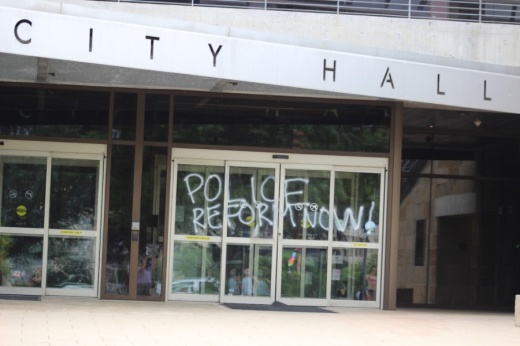The city’s 11 elected leaders each signed the “No Cash from Cops” pledge, a national effort from the Color of Change PAC that seeks commitments from those seeking elected office to reject campaign contributions from police unions. As of June 17, Austin’s mayor and City Council were the first full local dais in the country to make the commitment.
The move comes as community conversations heat up around reform of policing in Austin and across the country following the weeks of protests resulting from the death of George Floyd, who died May 25 at the hands of Minneapolis police. In Austin, those protests included calls for justice for Michael Ramos, an unarmed black man shot three times and killed by Austin police on April 24. The demonstrations in Austin grew violent at times, with police critically injuring some protesters and drawing heightened scrutiny of some of their aggressive tactics.
Only five Austin City Council members are actually up for re-election in 2020; however, the pledge does not indicate an expiration date on the commitment.
District 4 Council Member Greg Casar, who is up for re-election in November, said when he first ran for office in 2014, people told him the Austin Police Association was among the strongest gatekeepers of elected office in the city. The unanimous rejection of police union dollars aligns with an evolution in priorities for tCity Council over the last several years and even just over the last month, Casar said.
In 2017, the City Council unanimously rejected a police contract proposal that the city manager and police union agreed on—a first the city’s history. Last week, City Council unanimously supported taking the first steps toward significant police reform in the city, including committing to police budget cuts.
“This shows a significant shift in elected officials wanted to work constructively in transforming policing,” Casar said. “Union leaders have regularly opposed even the most reforms in the most destructive and misleading ways. This is a condemnation [of that].”
Casar announced June 16 he would donate $700—the exact amount the police union has donated to his campaign over the years—to the Austin Justice Coalition, a local activist group that focuses on social and criminal justice reform.
Austin Police Association President Ken Casaday called City Council’s move “political pandering” and said he was not surprised the elected officials signed the pledge. However, he said Casar’s decision to donate the funds instead of returning them to the union is “just another slap in the face to police officers.”
“It’s a different flavor. Over the years, [those seeking local elected office] have been on their knees begging for endorsements,” Casaday said. “Considering the times we’re in, this is not a surprise to us. These are tumultuous times.”
The PAC did not make any campaign donations during the most recent campaign finance filing period between April 26-May 25.
For Austin Mayor Steve Adler, who is midway through his second and final term as mayor, the commitment to not accept campaign contributions from the Austin Police Association PAC has less immediate impact. However, he said signing the pledge sends an important message to the community as City Council prepares to discuss a “reimagining of policing” and significant budget cuts.
“I think there is a disconnect between the police association and the community, generally,” Adler said. “But it’s real important for people to know that this council respects our police officers and their important function in our city.”
District 7 Council Member Leslie Pool, who is up re-election in November, said her commitment to not accept police union dollars assures her “objectivity” during the upcoming police budget conversations and efforts to significantly reform policing in Austin.
Casaday said although there have been rifts between City Council and the police union, he and the union stand ready to talk about reforms.
“We realize we need to work in an innovative way to change the police department,” Casaday said. “We’re on board with much more than they know. We have a lot more in common that do apart. It’s just a matter of sitting down and talking about it and making the changes that, quite frankly, needed to be made for the last 10 years.”
The current police union labor contract expires in 2022. Negotiations are expected to begin in 2021.





